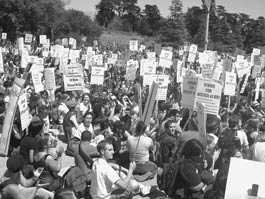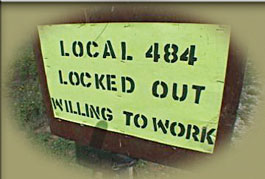home | metro santa cruz index | movies | current reviews | film preview

We Are Here: The bilingual documentary 'Estamos Aqui' captures last year's mobilization on behalf of UC service workers.
Fight The Power
After years of being sidelined, the labor movement is making a comeback, and Reel Work is back to chronicle it.
By Richard Von Busack
It's been five years since the start of Reel Work, the May Day Labor Film Festival, and now labor unions are getting stronger than they've been in years. Coincidence?
Reel Work is a 10-day multimedia fest, taking place in various venues from Watsonville to UCSC. It includes films, workshops, public appearances and a TBA or two. (Newly scheduled is Robert Greenwald's documentary, Wal-Mart: The High Price of Low Price. As the film notes, Wal-Mart, the nation's largest employer, faces unionization.)
Locally, teachers' unions are ready to leave the bargaining table and head for the barricades. And last year, the first UC-wide strike of service workers mobilized students from one end of the state to the other.
Reel Work's Paul Ortiz, a community studies professor at UCSC, comments that an interest in labor is natural for youth motivated by issues like fair-traded coffee and sweatshop prevention. "Questions of social justice are abstract; questions of wages and benefits aren't," says Ortiz. "These are exciting times. We're getting news from Latin America, South Africa and Korea, places where the labor movement has revived. We're also seeing a younger generation of activists, as seen in one of the Reel Work documentaries, Labor Women. These are young women of color. They're not just cigar-chomping, George Meaney types any more."
Playing on April 26 at Kresge College, Renee Tajima-Peña's Labor Women concerns the efforts of L.A.-based union organizers. It shares a double-bill with the bilingual doc Estamos Aqui (We Are Here) by Colectivo Media Insurgente, which captures images of last year's mobilization outside the gates of UCSC, where students joined the service workers trying to get a contract.
In interviews, janitors reveal the salaries they make mopping up the indescribable substances that might ooze onto the floors of your average college dormitory. "We are the ghosts that clean," one custodian says, but even a specter would be hard put to live in Santa Cruz on wages that range from 20 to 31K. That may have been good money once, but the UC regents have tacitly admitted how damned expensive it is to live here, when they gave the Chancellor's significant other a per diem that would choke a movie star.
Speaking of movie stars, Charlize Theron stars in the Nickelodeon's April 23 revival of North Country. It's Niki Caro's version of the story of Jenson v. Eveleth, the first class-action sexual harassment suit. Minnesota miner Cherie Averill-Manner will be on hand for an after-movie talk, as will fellow worker Dee Sabin.

Sign of the Times: Mutagenic chemicals take their toll in 'Locked Out 484.'
"Cherie is actually running for president of the neighboring local, right next to the one that filed the class-action suit," says Ortiz. "Dee is the union's election observer. They're actually taking a red-eye out here during the week of the election to be part of the festival. And they'll have something to say about the way Hollywood portrayed the experience of sexual harassment."
Locked Out 484 (April 30) follows the continuing strike by the Boilermakers Local 484 union against Celanese's emulsion plant in the west Illinois town of Meredosia. The workers there faced a 33 percent pay cut and a change in health benefits--benefits essential to workers who dealt with deadly and mutagenic chemicals.
The Luis Valdez-narrated Los Mineros, showing at the Cabrillo Center in Watsonville on April 28, tells of the copper miners' strike at Clifton-Monenci in Arizona. There, Mexican miners sought wage parity with their Anglo co-workers. Arizona State University prof Paul Espinosa's film won Best Documentary at the 1993 South by Southwest Festival.
In live performances, labor heroines are being feted at the fest. Bettina Aptheker, a bit of a feminist hero herself, introduces the play A Single Woman on April 30 at the First Congregationalist Church. The play's subject is the Honorable Jeannette Rankin. Write this down, in case Alex Trebek asks you someday: Rankin was the co-founder of the ACLU and the first female member of the U.S. Congress. She was a convinced pacifist who voted against both World War I and II. A local woman (she died in Carmel), Rankin left behind a useful epitaph: "If I had my life to live over, I would do it all again, but this time I would be nastier."
The following evening, the self-described hell-raiser Mary "Mother" Jones will be memorialized by Ronnie Gilbert of the Weavers, one of the founding engineers of the Great American Folk Music Scare. Reel Work wraps up with a Charlie King and Karen Brandow concert at the SEIU Union Hall on May 1, International Workers Day.
"We're trying to create a culture of solidarity, and we're trying to open up a dialogue," concludes Ortiz. "We don't have the answers, but we can look back at past experiences."
![]() Next week, Metro Santa Cruz talks to David Zeiger, director of the April 27 Reel Work presentation, 'Sir! No Sir!,' a documentary about the well-organized and popular resistance within the U.S. Army to the war in Vietnam that included at least a half-million "incidents of desertion" by the Pentagon's own count. For more information on Reel Work events,
go to www.reelwork.org.
Next week, Metro Santa Cruz talks to David Zeiger, director of the April 27 Reel Work presentation, 'Sir! No Sir!,' a documentary about the well-organized and popular resistance within the U.S. Army to the war in Vietnam that included at least a half-million "incidents of desertion" by the Pentagon's own count. For more information on Reel Work events,
go to www.reelwork.org.
Send a letter to the editor about this story.
|
|
|
|
|
|